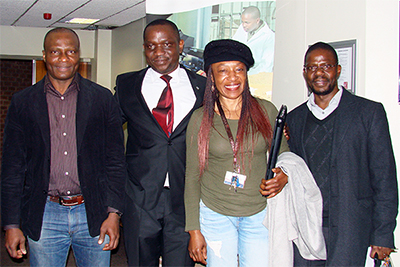College of Agriculture & Environmental Sciences
How stable are our staples?
The College of Agriculture and Environmental Sciences (CAES) hosted African Visiting Scholar Dr Anthony Onoja on 20 July 2018. He was invited by the Department of Agriculture and Animal Health.

Prof Christian Mbajiorgu, Dr Anthony Onoja (Visiting African Scholar), Dr Prudence Kayoka, and Prof James Oguttu
Each year CAES hosts at least four African visiting scholars as part of its lecture series. The scholars are invited to come and present lectures and share with the college their research that is aimed at the African community.
Onoja is currently a visiting researcher in the Department of Agriculture and Animal Health. He is a Senior Lecturer and current Head, Department of Agricultural Economics and Extension at the University of Port Harcourt, Nigeria.

Dr Anthony Onoja delivered the recent CAES African Scholar Lecture, which was hosted by the Department of Agriculture and Animal Health.
Motivated by sustainable development goals 1 and 2 (poverty and hunger reduction) and the African Union (AU) Malabo Declaration on Agriculture and Postharvest Losses, this research assessed the growth trends of cereal; and determined the factors related to governance and environment that have impacts on the long-term productivity growth of staples in the Southern African region.
Institutional data collected on the aggregate outputs of cereals and inputs (labour, land area, school enrolment, political stability index, government expenditure on research and development [R&D], trade openness, temperature change, and water access) were used.
Based on available data, nine out of 15 Southern African economies covering 12 years, i.e. 108 observations, were selected. The productivity growth performances were analysed using data envelopment analysis (DEA). Thereafter, panel unit root and co-integration tests were conducted before final analysis with the Panel Fully Modified Ordinary Least Squares model.
Results indicated that, between 2002 and 2013, cereal productivity was increasing, but slowly, with remarkable variations among the economies. South Africa leads in the indices of productivity, with Mauritius ranking last. The average rate of growth in total factor productivity (dTFP) was 1.81 while growth rate in technical change index, was 1.25. Change in total factor productivity efficiency (dTPE) was 1.46%. The growth in scale efficiency was 0.86. Average yields of cereals from 1961 to 2013 was 19,807.30 Kg/ha, ahead of the African average of 11,803.71kg/ha but far below the global average of 26,039.73Kg/ha).
In the long run, change in temperature, governance factors, especially quality of human capital and government expenditure on agriculture R&D, exerted very significant influences on the overall productivity growth of cereals.
It was recommended that Southern African countries should prioritise investment in human capital and technological innovation through increased budgetary allocations to education and agricultural R&D. Regional and individual governments in the region should, therefore, step up efforts to fund projects that will reduce the negative impacts of climate change and build the resilience of farmers for sustainable food production.
*By Gugulethu Ngcobo
Publish date: 2018/08/02

 Unisa co-hosts G20 community outreach in the Eastern Cape
Unisa co-hosts G20 community outreach in the Eastern Cape
 Unisans gain membership of prestigious science academies
Unisans gain membership of prestigious science academies
 Advocating for disability transformation through servant leadership
Advocating for disability transformation through servant leadership
 Unisa Press continues to illuminate the publishing space
Unisa Press continues to illuminate the publishing space